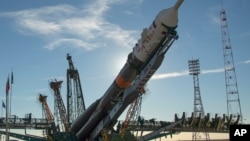The head of the U.S. space agency said Tuesday he's sure that investigators will determine the cause of a mysterious hole that appeared on the International Space Station, which his Russian counterpart has said was deliberately drilled.
NASA Administrator Jim Bridenstine also said collaboration with Russia's Roscosmos remains important, despite recent comments by agency head Dmitry Rogozin that Russia wouldn't accept a "second-tier role" in a NASA-led plan to build an outpost near the moon.
The hole that appeared in a Russian Soyuz capsule docked to the ISS caused a brief loss of air pressure in August before being patched. The incident sparked wide speculation and consternation.
"I strongly believe we're going to get the right answer to what caused the hole on the International Space Station and that together we'll be able to continue our strong collaboration," Bridenstine said. "What we've got to do is we've got to very dispassionately allow the investigation to go forward without speculation, without rumor, without innuendo, without conspiracy."
Although the U.S. is working toward commercial launches to the ISS, Russia shouldn't regard itself as sidelined, he said.
"There is coming a day when we're going to have our own access to the International Space Station through a commercial crew. I want to be really clear — that is not a replacement for the Russian Soyuz capabilities. We see it as redundancy and we want to make sure that even when a commercial crew is up and running we are still going to be launching American astronauts on Soyuz rockets and we would love to have Russian cosmonauts launching on commercial crew rockets in the United States," Bridenstine said.
Regarding the NASA-led Gateway project to build an orbiting moon outpost, Rogozin said recently that Russia couldn't afford to participate in other countries' projects in a secondary role. But Bridenstine said international involvement in the project was key.
"We're going to build an architecture between the earth and the moon where we can go back and forth a lot with robots and landers and rovers and humans ... the entire architecture between the Earth and the moon requires reusability. It requires international partners," he said.
Bridenstine met with Rogozin in Moscow on Tuesday and both will attend the Thursday launch of a manned capsule to the space station from Russia's space complex in Baikonur, Kazakhstan.







